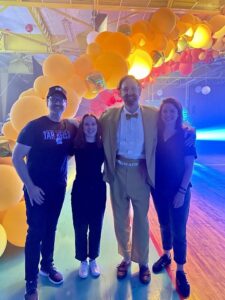News & Stories
Cool to be KIND

The ad was bizarre, irreverent and just the right balance of head-scratching and tongue-in-cheek.
It was exactly what Osher Hoberman (MBA ’04) wanted.
The TV commercial was KIND Snacks’ first big campaign following Hoberman’s appointment as chief marketing officer (CMO) in September 2023. It tapped comedians with millennial and Gen Z appeal, Eric Wareheim and Atsuko Okatsuka, to star, respectively, as the personification of the stomach and the brain at odds about a snack food decision as they danced together at prom.
The fresh message: KIND delivers on all elements of good — tastes good, feels good and does good.
The ad marks something of a refresh for the brand, which turned 20 in 2024 and launched new products including savory and seeds, fruit and nut bars, protein and zero-added-sugar bars.
KIND has consistently connected with consumers by showcasing its company-with-a-conscience altruism, supporting causes ranging from disaster relief funds with the American Red Cross to hosting a company-wide volunteer day on World Kindness Day, supporting eight nonprofits across the U.S.
KIND continues to set itself apart from the ever-crowded snack bar shelf in those ways, but Hoberman sees room for further growth, innovation and refinement of its brand identity.
“I love being a part of a business transformation situation,” says Hoberman. “I’ve done it with Snickers, and I’ve done it in other parts of my career. It’s an excellent opportunity to really challenge the existing thinking of a business, engage with consumers in new ways and make a distinctive imprint even for well-established brands. That has always been a big draw for me.”
In his 20-plus years at Mars, which he joined after graduating from UNC Kenan-Flagler Business School’s Full-Time MBA Program, Hoberman has managed household-name brands such as M&Ms, Skittles, Snickers and Milky Way, rising up the ranks to vice president of business development before being named KIND’s CMO.
He left a major mark at Mars in 2010 by developing the Snickers Super Bowl ad “You’re Not You When You Are Hungry,” featuring a trash-talking Betty White playing football before she morphs back to a more put-together young man after biting into a Snickers. The ad showcased Hoberman’s uncanny ability to breathe new, relevant life into a venerable, and perhaps stale to some, snack brand.
Snickers’ global revenue jumped nearly 16% in the first year alone after the ad first aired. That’s quite impressive for a candy bar introduced in 1930.
“When I was at UNC Kenan-Flagler, part of my decision-making process for the job I would choose coming out of school was wanting to be involved with brands that consumers loved, that they embrace because they really want to embrace them,” says Hoberman. “With KIND, it’s easy to bring consumers deeply into the brand, to have them help guide the brand experience alongside of you. That is when the magic happens.”
Hoberman’s marketing career is even more impressive considering the field wasn’t always his focus. His first job after earning a bachelor’s degree in finance from New York’s Binghamton University in 1997 was as a financial analyst for Deutsche Bank before moving to JPMorgan Chase as a senior financial analyst.
Then came the turning point. Hoberman explored the idea of going back to school on the heels of the dot-com bust, questioning whether investment banking would be his long-term career.
“I had about four years of experience after undergrad where I felt like I was starting to mature professionally, but I knew there was still more academic rounding I would benefit from,” says Hoberman. “I was at an inflection point career-wise and thought business school would help.”
When he applied to UNC Kenan-Flagler, he requested a remote interview with an alumnus because he was reluctant to travel after the Sept. 11 terrorist attacks. An admissions director insisted he come to campus to interview.
“She felt that one of the most unique aspects of UNC Kenan-Flagler was the campus experience,” he said. “I wouldn’t be able to understand the culture, the graciousness, the fun, the comprehensive nature of the program fully if I didn’t come down to see it firsthand. And boy, was she right.”

Hoberman (far left) on the set of KIND Snacks’ 2024 commercial
At Carolina he found a community where he could embrace the MBA experience he wanted and supported him through a career change. He found a diversity of business perspectives he hadn’t encountered before. He met students with experience in the business fields he was considering, including marketing, entrepreneurship and finance. In his home in New Jersey, he still keeps his brand strategy and corporate finance textbooks close by.
He also began to form an identity as a business leader as he expanded his view of leadership.
“UNC Kenan-Flagler started me on a leadership journey that continues today,” he says. “I’ve spent the last 20 years building my leadership philosophy around authenticity and adaptation and that started at Carolina. You want to stay true to who you are and that means understanding who you are and what you value. That’s what people see. That’s what makes you a genuine leader.
“Quite frankly, what people get from business school, but maybe don’t often say, is that it’s confidence building. If you go back to get your MBA and be a little bit vulnerable about where you need to improve and stay open to feedback, you can become more skilled at being yourself more often.”